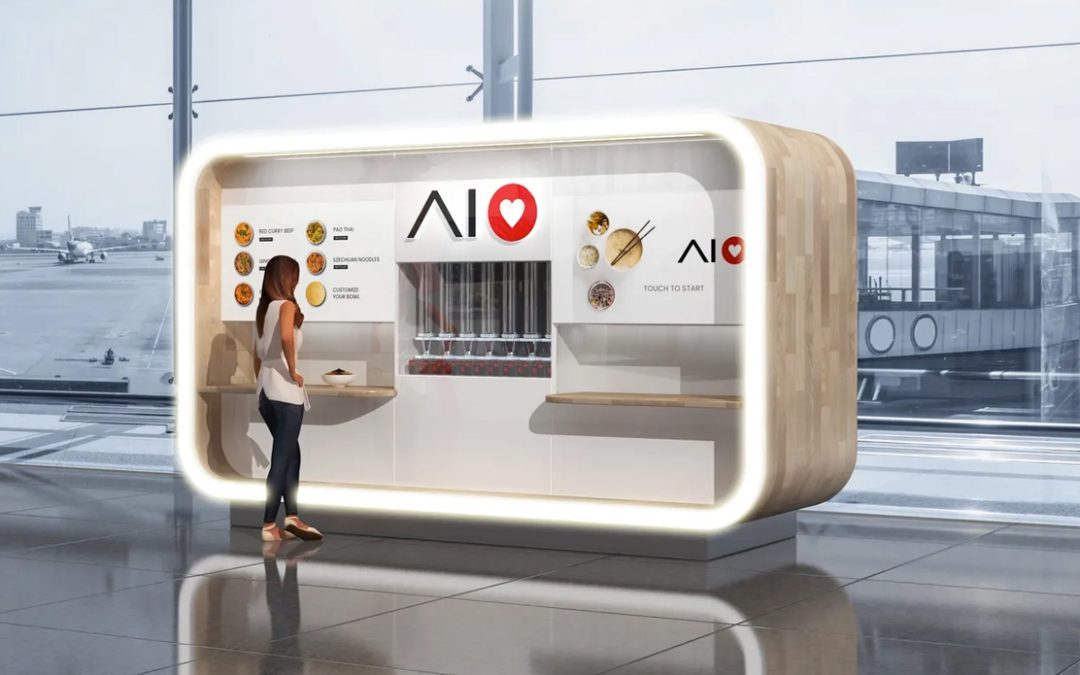Compass Group Canada will soon have three fully-robotic kitchens in a new partnership with SJW Robotics, the creator of RoWok.
Compass, the largest foodservice company in Canada with more than 2,200 locations across the country, will pilot three kitchens starting this fall. The devices are essentially van-sized kitchens that offer fresh meals at all hours. That’s a key use case for Compass, according to Heather Wilkie, VP of innovation at Compass.
“We’re on a mission to become the country’s most innovative foodservice provider, we’re doing this by offering some new business models,” said Wilkie. “Robotics and all of our innovation is an important part of progress. RoWok is an opportunity to amplify our services where it wasn’t possible before. We weren’t able to offer hot, customized meal on a 24-7 basis before this.”
Her and her team are still figuring out exactly where to put the machines, but each will operate in conjunction with an existing foodservice facility, but will dramatically extend hours of operation. That’s important in non-traditional settings like hospitals and university campuses.
“We believe there is an opportunity to offer 24-7 meals in the healthcare space where our overnight healthcare workers don’t have other options like this, so we want to pilot one there. One will be in a higher education space for students studying late, and we do have manufacturing spaces that operate 24-7 as well where this can work really well too,” said Wilkie.
She said physical automation has been a topic of discussion for a few years, but the new surge of robotic options made this the right time to invest in the potential. At this point, she and SJW Robotics cofounder and CEO Nipun Sharma are just waiting for food safety certification as the last hurdle before building the devices. Sharma said it’s just a matter of time and he hopes to be ready within the next couple months after the National Sanitation Foundation (NSF) signs off.
“You can’t make something in your garage and get it certified. My partners in this business specialize in making food and pharmaceuticals,” said Sharma. “Food safety was there on day one. So, when we started with the NSF, it was easier.”
While the groups wait, SJW is “translating” recipes for the RoWok device. There are some tricks to robotic operations, robots like consistency. So things like Sriracha needs a little translating.
“We had to pulverize the sauce a little more. Our chef will do that to different ingredients,” said Sharma.
But there is a lot of other back-end work to get ready for the pilot. Sharma said it involves a lot of different stakeholders to get things dialed in. He and Wilkie said it’s making both SJW and Compass stronger.
“We have weekly meetings between their financial team, POS systems their culinary teams.
It’s a very collaborative exercise, and it’ illuminating for us too, the probe different areas,” said Sharma. “Working with the team of compass has made our company much more intelligent.”
Wilkie said that’s part of being an innovative foodservice company today, taking a step back from the day-to-day process and making room for the unknown.
“We’re embracing that, we know in order to be innovative, we need to embrace change and the possibility of failure down the road. In the case something goes wrong we’ll fix it and move on. We’re confident that RoWok will be able to deliver some great high quality food,” said Wilkie, noting that it takes a village. “We have a great cross-functional team, our culinary chefs our health and safety QA team our finance and legal team and our innovation team our branding and marketing are working with SJW and Nipun to pull together an entire plan.”
She said the food is already great, she has tried the spicy pad Thai and Shanghai noodles developed by SJW.
As for the operations, each of the machines will piggy back on an existing Compass location. It’ll require three to four hours of additional staff hours, but not much else in terms of business change. Since Compass is already buying ingredients for their traditional locations, someone just needs to stock the machines.
That works out well financially, according to Sharma, RoWok cuts out 40 to 50 percent of operating costs. That balances out to about $1 million in revenue per machine, potentially more in busy airport locations with a little more price elasticity. Sharma said the model suggest a payback of seven months for an airport outlet and two to three years in other settings.


